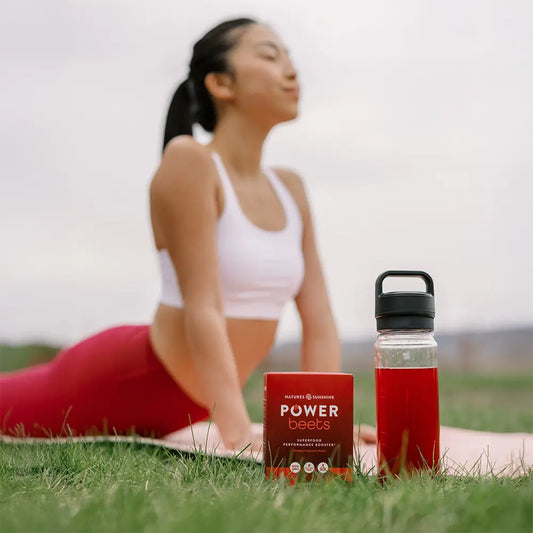Spring out of Allergies
Natural ways to Spring out of Seasonal Allergies
During this time of year when the blossoms are in bloom, a familiar seasonal reaction can occur. Symptoms may include itchy, watery, irritated and inflamed eyes, accompanied by frequent sneezing, coughing, wheezing and tightness in the chest.
can occur. Symptoms may include itchy, watery, irritated and inflamed eyes, accompanied by frequent sneezing, coughing, wheezing and tightness in the chest.
Allergic rhinitis (commonly known as hayfever) affects 1 in 5 adults and children in Australia.1
It is caused by environmental allergens, such as pollen, dust mites, mould and animal dander, which comes in contact with the nose and eyes.
When the allergens enter the nose or eyes, they initiate an inflammatory response as the body releases histamine.
It is important to support your immune system and to decrease body inflammation to prepare for the increased allergens in the air.
The immune system is known to protect the body against invading agents such as bacteria and viruses. In the case of allergies, the immune system mistakenly considers allergens to be an invading agent, thereby triggering an attack by antibody Immunoglobulin E (IgE), resulting in the body releasing histamine (an inflammatory chemical). 2
It is important to pay particular attention to supporting the immune system to minimise the inflammation associated with the reaction and the severity of the symptoms of seasonal allergies.
There are a number of natural anti-histamines and immune supporting herbs and supplements, which may be of benefit when dealing with allergy symptoms:
Vitamin C – present in many fruits and vegetables, as well as supplement form, vitamin C is an antioxidant, which supports the immune system and help counter the free-radical molecules that stimulate inflammation. Vitamin C is important for lung health and the respiratory system. Good sources of vitamin C are kiwi fruit, berries, guava, and leafy greens.
Golden Seal (Hydrastis Canadensis) – the active nutrient, berberine, found in Golden seal offers antibacterial and immune-enhancing properties. Golden seal’s anti-catarrhal and astringent action works to expel mucous congestion and heal irritated mucus membranes.
Eyebright (Euphrasia officinalis) – contains flavonoids in particular quercetin, which contributes to Eyebright’s anti-inflammatory and anti-oxidant properties. Quercetin is known to inhibit the release of histamine. 3 Eyebright has been used traditionally to help relieve inflammation of the mucous membranes of the nasal passages, as well as assist in relieving sinusitis, hayfever and nasal catarrh.
Cayenne / Capsicum – contain carotenoids, vitamin A and C which may assist to support the immune system4
Fenugreek’s soothing effects on the respiratory system assists with irritation and congestion of the nasal passages and sinuses.
Ginkgo - contains bioflavonoids, with beneficial antioxidant and anti-inflammatory properties to support the immune system.
Ginger’s calming actions may provide assisting to the nervous system at times of stress faced during allergy season.
Turmeric – the anti-inflammatory actions of curcumin provides assistance with inflammatory conditions.
Supporting supplements
Omega 3 – its anti-inflammatory properties provide support during times of inflammation. Foods rich in Omega 3 include cold-water oily fish (such as salmon, mackerel, tuna and sardines), avocado and nuts.
Vitamins A and vitamin D are natural anti-inflammatories to reduce inflammation of the mucus membranes.
Zinc supports the immune system and strengthens the mucous membrane. Zinc lozenges may soothe inflamed mucous membrane.
Nutritionally, it may be useful to eliminate common trigger foods to assist to minimising allergies. These include gluten, casein (dairy), soy, eggs, nuts, corn, alcohol, which can contribute to increase mucous production.
Lifestyle changes- It can be a challenge to avoid airborne allergens, however, be informed of the peak times for pollens and pollution counts and avoid (if you can) going out during these times. The weather channel and websites provide high allergy alert forecast.
- Anti-allergy devises such as HEPA (high efficiency particulate arresting) air purifiers can help remove pollen and mould spores in the air at home. Ensure filters are cleaned regularly.
- Remove carpets, rugs and other surfaces that collect allergens in the home.
- Avoid dogs and cats (if possible) to minimise contact with animal dander. If you have pets at home, brush and wash pets, as well as their beddings frequently.
- Wash before going to bed to reduce pollens collected on clothes and skin.
- Cover bed mattresses in allergen-proof plastic and use hypoallergenic bedding materials. Wash sheets, blankets, pillowcases and mattress covers every week in hot water with an additive and fragrance free detergent. Use an indoor drying rack for laundry items to reduce pollen collection.
- Australian Society of Clinical Immunology and Allergy (ASCIA) Aug 2015 www.allergy.org.au/patients/information
- Better Health Aug 2015 http://www.betterhealth.vic.gov.au/bhcv2/bhcarticles.nsf/pages/Allergies
- Weng, Z et al. (2012) Quercetin is more effective than cromolyn in blocking human mast cell cytokine release and inhibits contact dermatitis and photosensitivity in humans. PLoS One 2012; 7:e338
- Blom HM et al (1997) Intranasal capsaicin is efficacious in non-allergic, non-infectious perennial rhinitis. A placebo-controlled study. Clin Exp Allergy 1997; 27:796.


